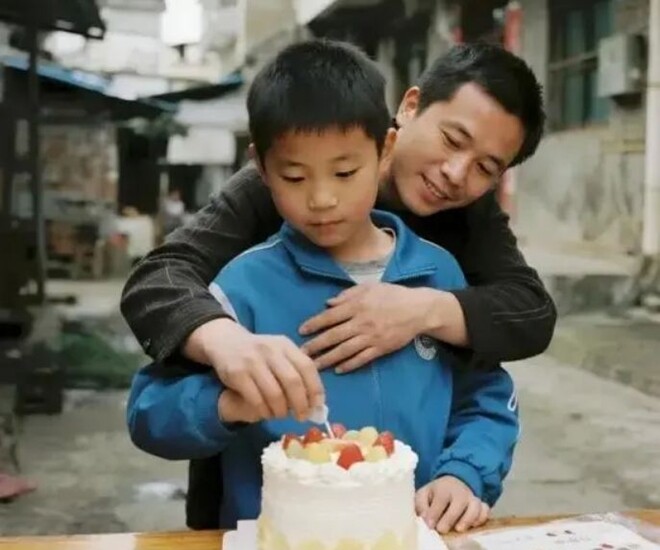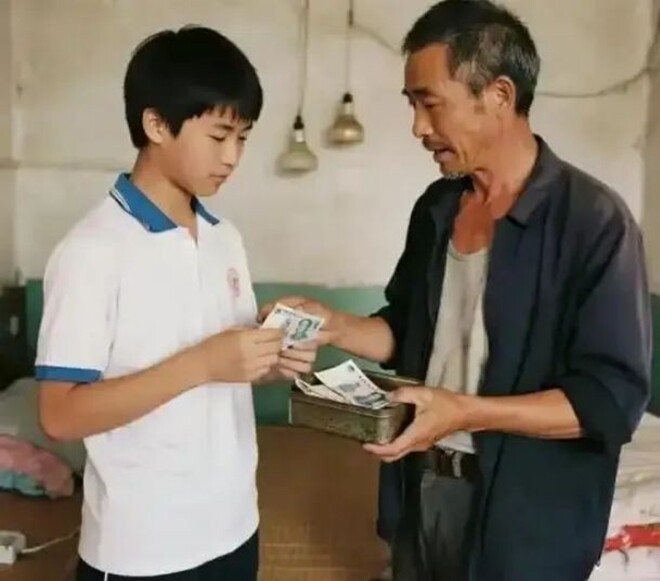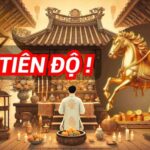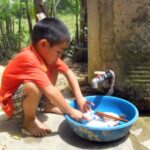I was four years old when my mother remarried. My stepfather was a builder. He came into my mother’s life with nothing but the clothes on his back. The only things he brought with him were a lean frame, sun-kissed skin, and calloused hands from years of mixing mortar and laying bricks.
At first, I didn’t like him. To a young child, he was a stranger, often coming home late, his body reeking of sweat and cement dust.
But he was the one who first fixed my old bicycle and mended my broken sandals without saying a word. When I made mistakes, he didn’t scold me; he quietly cleaned up the mess I had made. Once, when I was being bullied at school, he didn’t shout at me like my mother did; he quietly rode his bike to pick me up. On our way home, he said:
– You don’t have to call me dad, but I’ll always be here for you if you need me.
I remained silent, not knowing how to respond. But from that day on, I started calling him dad.

My stepfather treated me very well. (Illustration)
Throughout my childhood, my memories of my stepfather are of his old bicycle, his dusty construction site clothes, and the days when he would come home late, his eyes tired, and his hands still covered in mortar.
But even when he came home late, he never forgot to ask about my day:
– How was school today?
He didn’t have a high level of education, and he couldn’t help me with difficult math problems or complex essays, but he always emphasized the importance of knowledge:
– You may not be the best in your class, but you must always study diligently. Wherever you go, people will respect you for your knowledge.
He didn’t say this often, but I remember it well.
My mother was a farmer, and my stepfather was a builder. Our family depended on his meager income. I was a good student, but I understood our family’s financial situation, so I never dreamed big. When I passed the university entrance exam, my mother cried, and my stepfather quietly sat on the porch, smoking a cheap cigarette.
The next day, he sold the only motorcycle we had to pay for my tuition. He also brought a box of country gifts, including a few kilos of rice, a jar of shrimp paste, and some roasted peanuts.
Before leaving the dormitory, he looked at me and said briefly:
– Do your best, and study hard.
I didn’t cry, but after he left, I opened the lunch box my mother had packed, and underneath the banana leaves, I found a folded letter with his clumsy writing:
– I don’t know what you’re studying, but I’ll keep working as long as you keep learning. Don’t worry.
I studied for four years as an undergraduate and then went on to graduate school. My stepfather continued to work as a builder. His hands became more calloused, and his back started to bend. Once, when I returned home, I saw him sitting at the bottom of the scaffolding, breathless from climbing up and down all day, and my heart ached.
I wanted to tell him to stop working, but he waved me off:
– I can still work. Every time I get tired, I think of supporting a Ph.D. student, and I feel proud.
I smiled but didn’t dare tell him that pursuing a Ph.D. meant I had to work multiple jobs and strive even harder. But he was the reason I never gave up.

When I got into university, my stepfather sold his motorcycle to pay for my tuition. (Illustration)
On the day of my Ph.D. dissertation defense, I invited my stepfather to attend. At first, he refused, saying he was uneducated and uncomfortable going to the city. I had to beg him and even lie that the university required a family member to be present. Finally, he agreed and borrowed a suit from my uncle, wore shoes that were a size too small, and bought a new hat from the county market.
That day, he sat in the back row of the auditorium, quietly watching me present my dissertation. I saw him trying to sit up straight, his eyes never leaving me.
When the defense was over, my supervisor came to shake my hand and introduce himself to my stepfather. He paused when he recognized him and said:
– Aren’t you Uncle Hoa? When I was a child, we lived near one of your construction sites. I remember once you carried an injured worker down from the scaffolding even though you were injured yourself.
Before my stepfather could say anything, my supervisor continued, his voice filled with emotion:
– I never thought I’d meet you here today as the father of a new Ph.D. graduate. It’s truly an honor.
I looked over at my stepfather, and he was smiling, his eyes glistening with tears. In that moment, I understood that he had never expected anything in return from me. But today, he was the one being recognized, not because of me, but because of his own silent sacrifices over the past 25 years.
Now, I am a university lecturer with a family of my own. My stepfather no longer works as a builder. He tends to his vegetable garden, raises chickens, reads the newspaper in the morning, and cycles around the neighborhood in the afternoon. Occasionally, he calls me to boast about his latest crop or to ask me to come home and get some chickens and eggs for my son.
I asked him:
– Don’t you regret all the hard work and sacrifices you made for me?
He laughed and said:
– Why would I regret it? I’ve built many houses in my life, but the one I’m most proud of is the person I built in you.
I didn’t respond. I just looked at his hands, which had carried the weight of my future. I am a Ph.D. graduate. My stepfather is a builder. He didn’t build a house for me, but he built a person.



































